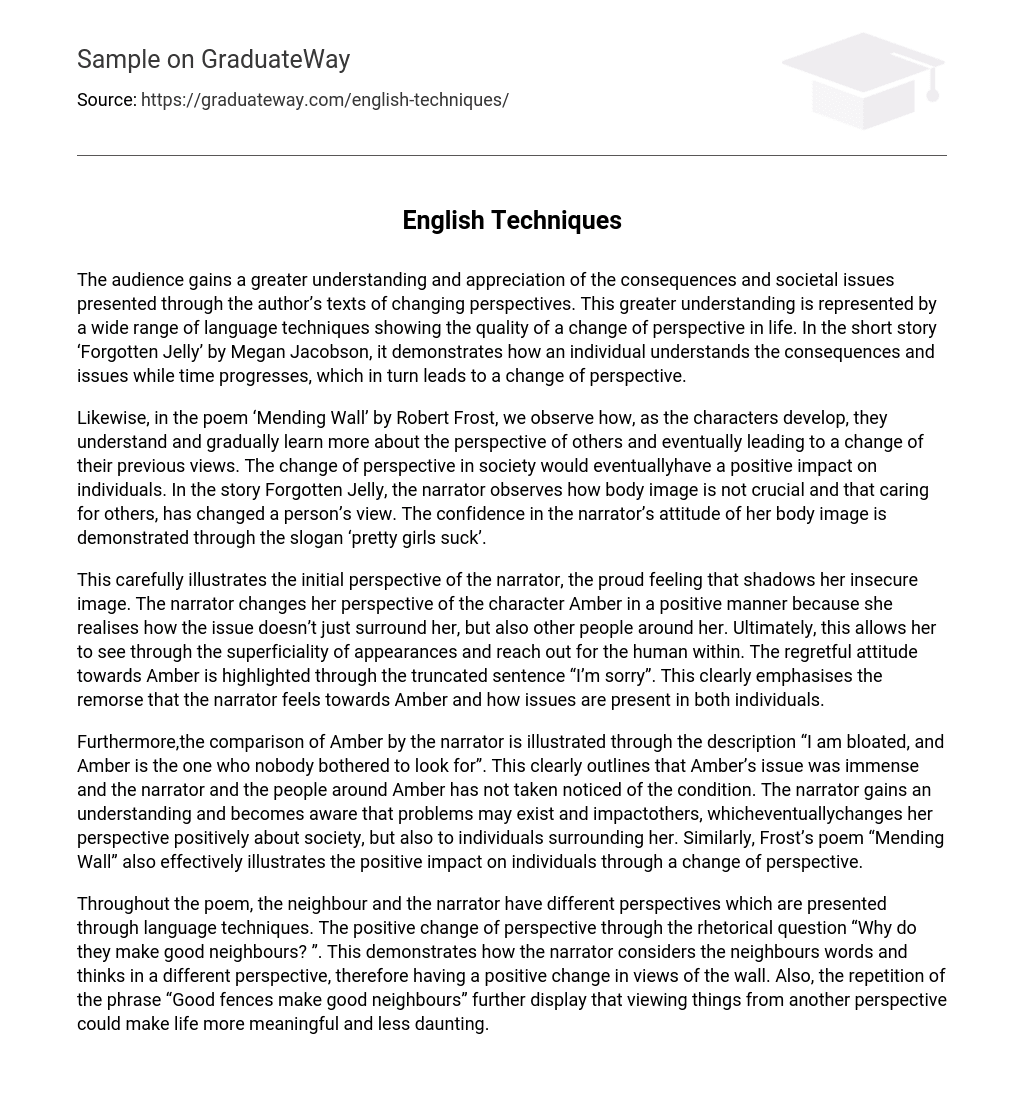The audience gains a greater understanding and appreciation of the consequences and societal issues presented through the author’s texts of changing perspectives. This greater understanding is represented by a wide range of language techniques showing the quality of a change of perspective in life. In the short story ‘Forgotten Jelly’ by Megan Jacobson, it demonstrates how an individual understands the consequences and issues while time progresses, which in turn leads to a change of perspective.
Likewise, in the poem ‘Mending Wall’ by Robert Frost, we observe how, as the characters develop, they understand and gradually learn more about the perspective of others and eventually leading to a change of their previous views. The change of perspective in society would eventuallyhave a positive impact on individuals. In the story Forgotten Jelly, the narrator observes how body image is not crucial and that caring for others, has changed a person’s view. The confidence in the narrator’s attitude of her body image is demonstrated through the slogan ‘pretty girls suck’.
This carefully illustrates the initial perspective of the narrator, the proud feeling that shadows her insecure image. The narrator changes her perspective of the character Amber in a positive manner because she realises how the issue doesn’t just surround her, but also other people around her. Ultimately, this allows her to see through the superficiality of appearances and reach out for the human within. The regretful attitude towards Amber is highlighted through the truncated sentence “I’m sorry”. This clearly emphasises the remorse that the narrator feels towards Amber and how issues are present in both individuals.
Furthermore,the comparison of Amber by the narrator is illustrated through the description “I am bloated, and Amber is the one who nobody bothered to look for”. This clearly outlines that Amber’s issue was immense and the narrator and the people around Amber has not taken noticed of the condition. The narrator gains an understanding and becomes aware that problems may exist and impactothers, whicheventuallychanges her perspective positively about society, but also to individuals surrounding her. Similarly, Frost’s poem “Mending Wall” also effectively illustrates the positive impact on individuals through a change of perspective.
Throughout the poem, the neighbour and the narrator have different perspectives which are presented through language techniques. The positive change of perspective through the rhetorical question “Why do they make good neighbours? ”. This demonstrates how the narrator considers the neighbours words and thinks in a different perspective, therefore having a positive change in views of the wall. Also, the repetition of the phrase “Good fences make good neighbours” further display that viewing things from another perspective could make life more meaningful and less daunting.
As a result, the author presents both of these contrasting perspectives to demonstrate how society and people, view the same subject matter (wall) in a different way. In addition, the perspective of the wall is presented through the use of juxtaposition “What I was walling in or walling out”. This strongly highlights both perspectives from the neighbour and narrator, as walling in displays the idea of connecting and protecting yourself, and on the other hand walling out brings out the idea of keeping people out or abandoning them.
Thus, whilst positioning both these ideas together, the audience understands how the text effectively suggests the different perspectives on the situation of building a wall, which has a positive impact for individuals therefore we can elaborate our understanding of social consequences. The perspective of the characters or individuals in ‘Mending Wall’ and ‘Forgotten Jelly’ has demonstrated a positive change in views because both texts understand and acquire a wider range of perspective towards others. Therefore, the audience gains a greater understanding of the consequences of societal issues presented by the author’s text of perspectives.





